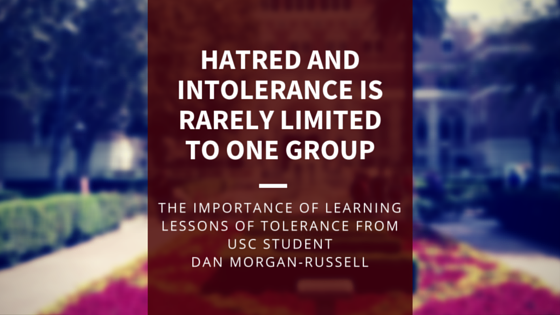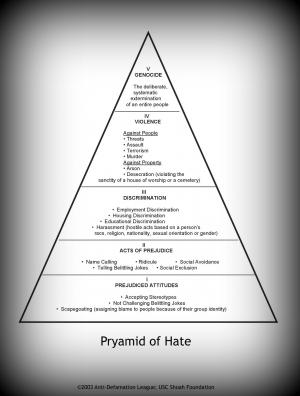Hatred and intolerance is rarely limited to one group
A few weeks ago, USC Student Body President Rini Sampath posted on her Facebook page about incidents of hatred and intolerance on campus. A Saturday night after a USC football game, Sampath had been walking down USC’s Fraternity Row when a man leaned out his frat house window and hurled a racial epithet and a beverage cup at her. Sampath’s post about the incident touched off a storm, with reports from the Washington Post, Los Angeles Times, and NBC News, as well as responses from USC officials and a forum about intolerance on campus.

However, while the racial epithet against Sampath was widely publicized and discussed, Sampath herself had discussed a second incident that day which received almost no coverage and no public response. That Saturday game-day morning, a friend of Sampath’s attempted to join a fraternity-hosted tailgate. The members of the fraternity excluded the USC student, firing a three-lettered homophobic slur at him in the process. That night, a member from that same fraternity hurled his drink and his racist comment at Sampath.
The fraternity in question, after considerable media attention, suspended the drink-and-epithet hurling member and evicted him from the frat house. However, the fraternity made no mention of the incident that Saturday morning, has apparently not investigated the matter, and presumably will not be pursuing action against its homophobic tailgate hosts.
As a USC student I believe this is a significant problem. The Trojan family and the wider world must be aware that incidents of hatred and intolerance are rarely isolated. Campus cultures or institutions that allow or tolerate racial hatred and intolerance will likely also allow and tolerate homophobic, misogynist, transphobic and other discriminatory or hateful attitudes.
Learning from the Pyramid of Hate
USC Shoah Foundation’s Pyramid of Hate lesson recognizes that hatred and intolerance escalates from prejudiced attitudes, such as accepting stereotypes or allowing belittling jokes, all the way to genocide, the deliberate and systematic extermination of an entire people. Each step in the pyramid grows on the last- prejudiced attitudes lead to prejudiced actions, prejudice leads to discrimination, and discrimination leads to violence. While the actions of one frat boy late on a Saturday do not constitute genocide, they represent USC’s progression down a road that has led to the worst crimes imaginable. USC needs to remain vigilant to prejudicial attitudes, acts of prejudice and discrimination on campus so we do not move farther up the pyramid.
 The best time to combat these harmful beliefs and accepted actions on campus is now. Intervening in this process once serious discrimination, targeted violence, or genocides are happening is always more costly, more hazardous, and less likely to succeed. USC needs to nip these unacceptable norms and practices in the bud before they bloom into something even worse.
The best time to combat these harmful beliefs and accepted actions on campus is now. Intervening in this process once serious discrimination, targeted violence, or genocides are happening is always more costly, more hazardous, and less likely to succeed. USC needs to nip these unacceptable norms and practices in the bud before they bloom into something even worse.
Learning through Testimony
As I see these modern day acts of discrimination, I connect these acts to testimony and reflect on what I have researched as an intern here at USC Shoah Foundation. During the Holocaust, Nazis targeted homosexuals, political prisoners, Roma and Sinti, people with disabilities, and other marginalized groups for extermination, in addition to six million Jews. USC Shoah Foundation’s Visual History Archive contains hundreds of testimonies from people that the Nazis tried to murder because the Nazis deemed these groups of people inferior to Aryan Germans.
Julia Lentini, a Roma Sinti (Gypsy) survivor, recalls being packed into a cattle car with her family for the three-day trip to the Auschwitz-Birkenau Extermination Camp: “That whole train was just full of prisoners, haeftlinge… Jewish people, Gypsy people, Polish people, political people, all kinds in the different wagons. … three days later, we did stop in Auschwitz.” The Nazis did not contain their genocide to one group of people.
Implementing Lessons of Tolerance
On this campus we must realize that hatred and discrimination against any group needs to be confronted, because that hatred and discrimination can grow and proliferate to target other groups of people. Poet Martin Niemöller, who spent seven years imprisoned in concentration camps, wrote about the dangers of inaction in his poem “First They Came."
First they came for the Socialists, and I did not speak out—
Because I was not a Socialist.
Then they came for the Trade Unionists, and I did not speak out—
Because I was not a Trade Unionist.
Then they came for the Jews, and I did not speak out—
Because I was not a Jew.
Then they came for me—and there was no one left to speak for me.
We as USC students need to oppose all hatred and intolerance on campus. If we do not act, hateful and intolerant attitudes will fester, grow, and multiply. Intolerance, left unchecked, threatens every club, organization, group, and person on this campus.
It’s time for Trojans to stand up and speak out.
Like this article? Get our e-newsletter.
Be the first to learn about new articles and personal stories like the one you've just read.